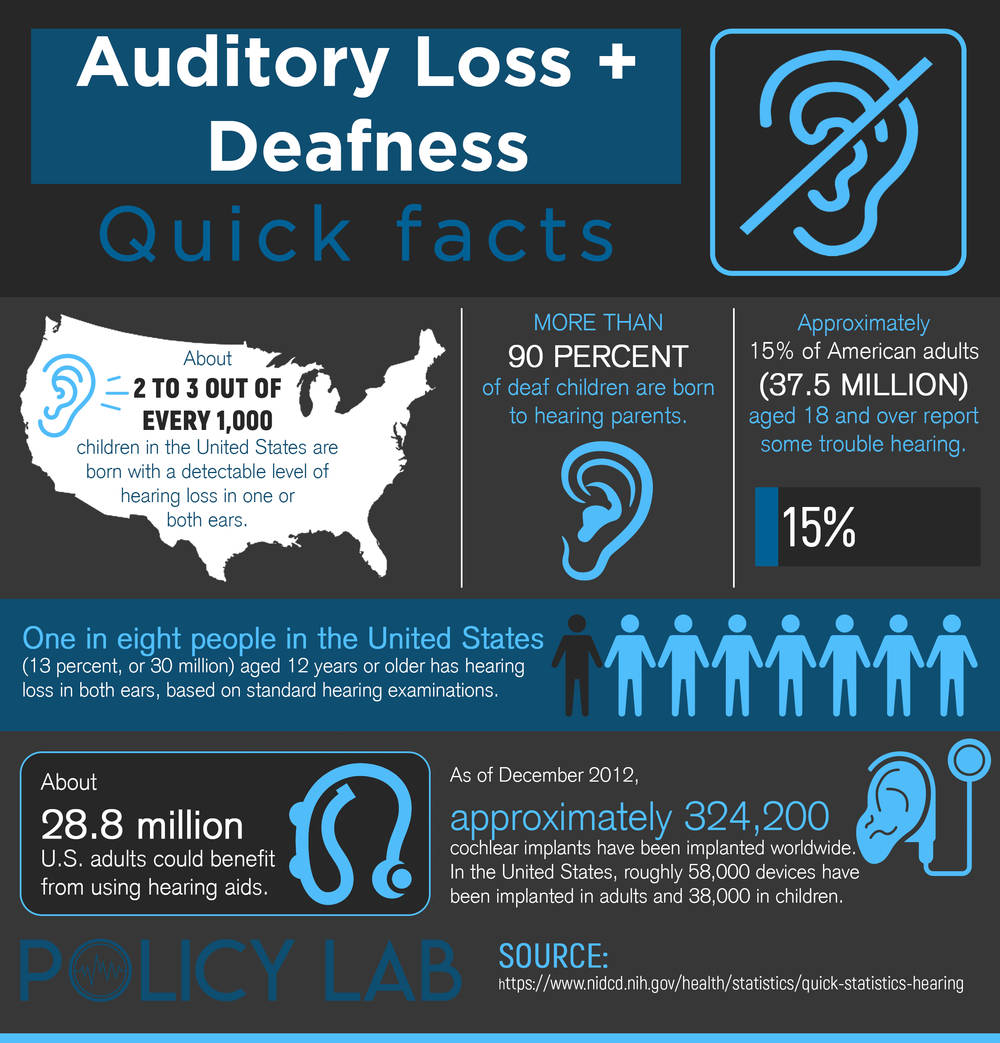Match to Auditory Loss Deafness Clinical Trials
Hearing problems are more common than we tend to believe, with around 15% of adults in the United States reporting some kind of auditory trouble, and one out of every eight Americans aged 12 years and older are experiencing hearing loss in both ears.
The most common cause of auditory loss is age, and it is believed that after 75, 50 percent of older adults will lose all or part of their hearing. The main types of hearing loss are sensorineural, conductive, or a combination of both.
Sensorineural is by far the most common, and it is the type of hearing loss that most often occurs during aging. It happens when parts of the ear, including the nerves or the cochlea, become damaged either by trauma (accidents, disease, extreme sounds, etc.) or as a result of the aging process. An individual with sensorineural hearing loss does not lose their entire ability to listen but they will hear all sounds extremely low.
On the other hand, conductive auditory loss happens when either a disease or a physiological disorder is preventing the sound from entering to the inner ear. Some common causes of conductive hearing loss include ear infections, excessive fluid or earwax, and abnormalities in the formation of the ear.

What Are Clinical Trials?
When scientists find empirical reasons to believe that a new drug, treatment or medical device has the potential to cure or improve a condition or disease, they will set out to research it and test it out. This research process takes several years and has many phases to ensure that once a medical product is released, it is scientifically reasonable to assume that it’s benefits greatly outweigh the risks.
A big part of the research process is the clinical trial. Every clinical trial is different; some trials might involve a group of volunteers receiving a new medication, treatment or device in order to assess its effectiveness, potential side effects, interactions, and reactions. Other clinical trials are conducted to investigate the effects of lifestyle or behavior modification; on these studies the participants might not receive any treatment at all, instead they will be prescribed a new diet or lifestyle regime and researchers will observe the changes that occur.
All clinical trials are completely voluntary, meaning that any individual who is invited to participate has a right to decline or withdraw their consent at any point during the study. All research studies that involve human participants are very closely monitored by internal and external regulatory agencies such as the FDA and the Interval Review Board (IRB) to make sure the trials are being conducted in a safe and ethical manner.
Will Enrolling in a Clinical Trial Cure My Auditory Loss/Deafness?
While participating in a clinical trial will give you the opportunity to receive some of the latest treatments being developed, there are no guarantees that participating in a clinical trial will cure or even improve any medical conditions you might have.
However, there are benefits to participating in a clinical trial. One of the main reasons that individuals agree to participate in a research study or clinical trial is to help others. When you participate in a clinical trial you are helping the scientific community expand their knowledge about a specific area or disease, which means that they will have more information available to create newer and better treatments in the near future.
Match to Auditory Loss Deafness Clinical Trials
What Are the Risks of Clinical Trials?
If you decide to participate in a clinical trial the researchers will ask you to sign a document that explains all the potential risks and benefits associated with the study. This document is called an informed consent form, and all participants are required to sign one before enrolling in a research study.
Clinical trials are generally safe because they have been carefully designed following a long list of safety requirements set by regulatory agencies. And while there is always the possibility of side effects or adverse reactions that the investigators could not anticipate, all participants are meticulously monitored, and researchers will immediately suspend the treatment if they believe the participant might be in danger.
Who Can Enroll in a Clinical Trial?
Researchers want clinical trials to be as diverse as possible because that means they can generalize their findings to a greater population. However, some clinical trials can be very specific; for example, investigators testing a particular hearing loss device, might only be looking for adults with conductive auditory loss. If you are interested in participating in a clinical trial ask your doctor if he/she knows about any studies in your local area. There are also many online resources that will help you find a clinical trial that is right for you.
Match to Auditory Loss Deafness Clinical Trials
Sources
- Hearing Loss: A Common Problem for Older Adults. Recovered from https://www.nia.nih.gov/health/hearing-loss-common-problem-older-adults
- Types of Hearing Loss. Recovered from https://www.asha.org/public/hearing/types-of-hearing-loss/